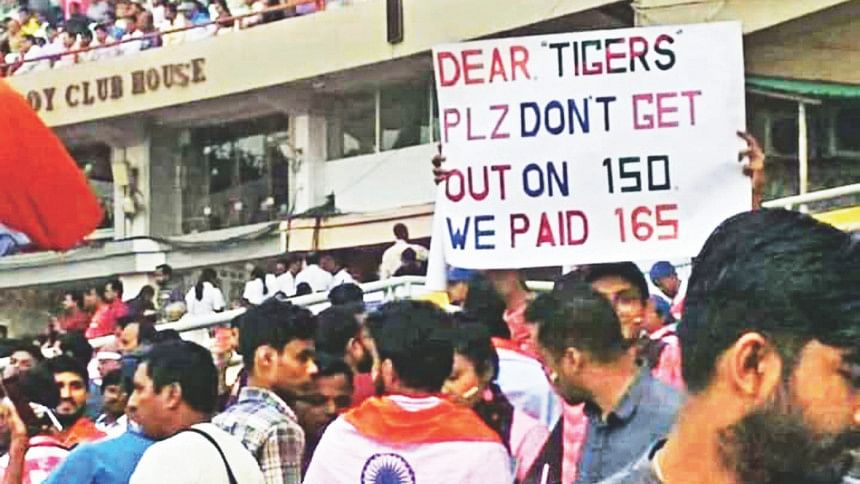Hassan’s evasion not the solution

Bangladesh lost their first-ever Test series in India 2-0. It was not unexpected. They lost both games inside three days, each by an innings. That too was not unexpected.
The Tigers were subjected to an Indian pace bowling masterclass in both the games, which was a tad different considering India’s traditional home dominance on tailor-made spinning tracks. The trial by pace is something of a new treat for touring teams in India and it has been built around a well-laid plan from the Indian cricket establishment. The reward of focusing on what used to be weak link is now paying dividends and India are not only the top-ranked Test team, but also fiercely competitive away from home.
This is a lesson to learn for lesser teams like Bangladesh in order to be competitive in the cut-throat Test format. Unfortunately, this is also an area that Bangladesh’s cricket establishment has hardly focused on since their elevation to Test status 19 years ago in 2000.
Excuses have recently become a well-worn crutch after every punishing defeat, and it was no exception after the Tigers’ meek surrender in the second Test at the Eden Gardens in Kolkata. Bangladesh Cricket Board’s (BCB’s) all-encompassing president Nazmul Hassan was quick to shift the blame on the team management and also blast the application of the players.
He said he was surprised at the team management’s decision to bat first after winning the toss. The decision can be argued.
But can our so-called expert cricket chief explain the rationale of agreeing to play a pink-ball Test against India without any of the cricketers playing it in domestic cricket?
Isn’t it a crime to push his charges into the deep end, knowing that it might cause physical harm? One could argue that the situation was also the same for India. But India’s deep-rooted cricket culture and the strong domestic structure it was built on is far more capable of facing any unforeseen adversity, compared to the ill-structured Bangladesh cricket.
Hassan came up with the same rhetoric when Bangladesh suffered a chastening defeat against Afghanistan in the one-off Test at home. He blamed Shakib Al Hasan for not endorsing a spinning wicket that Bangladesh had successfully employed against Australia and England. He even suggested that some of the players were not mentally tough enough or were reluctant to play Test cricket.
But when asked if it was a shame that Bangladesh lost a match against a team who were playing only their second Test, Hassan’s response was that he “was hurt”.
The BCB boss then said he was more disappointed for losing the World Twenty20 game in 2016, the Nidahas Trpohy final (in Sri Lanka in 2018), the Asia Cup final (in Shahjah in 2019) against India.
Evading the issue and redirecting blame was also the theme after the defeat in the first Test against India in Indore. Hassan then focused more on how Bangladesh lost the final T20I game after winning the first match of the three-match series.
Hassan is nearing the completion of a second term at the most coveted BCB post. In nearly seven years in office, he deserved to be credited for handling a few on- and off-field crises. But unfortunately, his main focus has been on the national team and the shorter formats of the game.
It appears that while Hasan and his troops have been happily operating on an annual ICC financial windfall, they are oblivious of the fact that it was only guaranteed after becoming a Test-playing nation.
You can be happy with some success in the shorter formats, but if you ignore the Test format you might one day find yourself facing a fund crisis and still sitting on a poor domestic structure not capable of producing quality players to pull you out of the grave.
Hassan has promised two things when he was elected for a second term in 2016 -- decentralising cricket and building sporting that reward pace as well as spin. He also said that they would immediately start the decentralisation process with a pilot project in Chattogram.
Three years on, you can find only one sporting wicket in Rajshahi. And regarding decentralisation, which was meant to empower the division headquarters to nurture talent from the grassroots, what happed till date is anybody’s guess.
The Dhaka Premier League is a pale shadow of its glorious self, the lower tier is riddled with systematic fixing and first-class cricket is a seasonal affair with little purpose. And unless the board looks at the root of the problem instead of diverting blame, the Tigers will continue suffering on cricket’s real front.

 For all latest news, follow The Daily Star's Google News channel.
For all latest news, follow The Daily Star's Google News channel. 



Comments